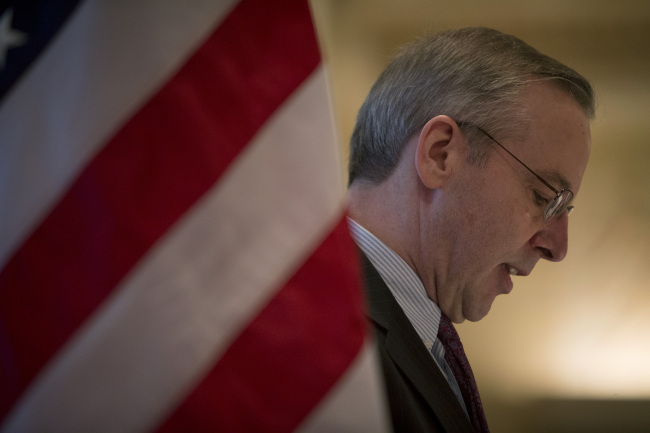Inflation running below the Federal Reserve’s target argues for “patience” on interest-rate increases and may require letting the economy run “a little hot,” New York Fed President William Dudley said.
“Depending on where inflation is, I can certainly imagine a scenario where the unemployment rate dips a little below” what the Fed considers maximum employment, he said Monday in an interview with Matthew Winkler, editor-in-chief of Bloomberg News. “We really need the economy to run a little hot for at least some period of time” to push inflation back up to the 2 percent objective, he said.
Dudley’s comments highlight an unusual feature of the Fed’s most recent economic forecasts: Several policy makers figure the jobless rate will have to dip below their estimate of full employment to push prices back toward the goal Fed officials missed for more than two years.
“You really do want to push the unemployment rate down toward your objective,” Dudley said at the Bloomberg Markets Most Influential Summit in New York.
 |
New York Fed president William Dudley. (Bloomberg) |
In a wide-ranging discussion, the New York Fed chief also said the central bank is looking for ways to improve its communications with the public and is on the lookout for evidence of asset-price bubbles. He said raising interest rates prematurely is a greater risk than lifting them too late.
“There are some reasons to try to be patient,” Dudley said. “The first reason to be patient is you want to make sure that when you do lift off, that you actually are successful, that you don’t lift off and then it turns out that the economy weakens and you have to reverse course.”
Treasuries gained for a third day after Dudley’s comments. Benchmark Treasury 10-year yields fell one basis point, or 0.01 percentage point, to 2.56 percent as of 1:36 p.m. New York time after touching 2.55 percent, the least since Sept. 12.
Most Fed officials predict the Fed will raise the benchmark interest rate above zero sometime in 2015, according to forecasts published Sept. 17. The increase would be the first since 2006.
Officials see growth of 2.6 to 3 percent next year, according to central tendency estimates, which omit the three highest and three lowest forecasts. That should help push unemployment down to 5.4 percent to 5.6 percent, from 6.1 percent in August. They also forecast inflation to remain below their goal.
One risk is that the public’s outlook for prices begins to deteriorate, pushing the U.S. into a prolonged period of too-low inflation. An interest-rate increase in a low inflation environment could crimp consumption as households pay more for mortgage, car and credit-card debt without seeing much increase in overall compensation.
There’s little evidence of inflation on the horizon. The earnings of Americans have shown scant gains in inflation-adjusted terms in the past two years. Oil prices are down about 7 percent this year, while industrial materials prices tracked by the JoC-ECRI Industrial Price Index have fallen almost 2 percent.
Prices rose 1.6 percent in July from a year earlier, according to the Fed’s preferred inflation gauge, the personal consumption expenditures index.
Yield differences between U.S. Treasuries and inflation-linked bonds show expected inflation of about 1.3 percent and 1.4 percent in 2015 and 2016, said Michael Pond, head of global inflation strategy at Barclays Plc in New York. (Bloomberg)





![[Exclusive] Hyundai Mobis eyes closer ties with BYD](http://res.heraldm.com/phpwas/restmb_idxmake.php?idx=644&simg=/content/image/2024/11/25/20241125050044_0.jpg)

![[Herald Review] 'Gangnam B-Side' combines social realism with masterful suspense, performance](http://res.heraldm.com/phpwas/restmb_idxmake.php?idx=644&simg=/content/image/2024/11/25/20241125050072_0.jpg)
